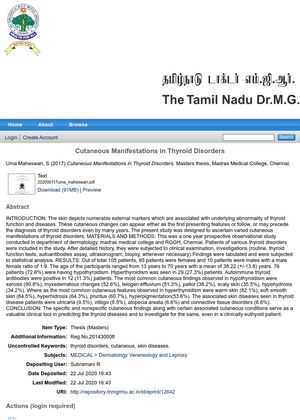Cutaneous Manifestations in Thyroid Disorders
April 2017

TLDR Skin changes can help predict thyroid diseases.
The 2017 study "Cutaneous Manifestations in Thyroid Disorders" by Uma Maheswari, S, conducted at Madras Medical College and RGGH, Chennai, examined the skin changes associated with thyroid disorders. The one-year observational study included 105 patients, with a female to male ratio of 9:1 and ages ranging from 13 to 70 years. The study found that 72.6% of the patients had hypothyroidism and 27.3% had hyperthyroidism. The most common skin findings in hypothyroidism were xerosis (90.8%), myxedematous changes (52.6%), and telogen effluvium (51.3%). In hyperthyroidism, the most common skin features were warm skin (82.1%), soft smooth skin (64.5%), and hyperhidrosis (64.3%). Associated skin diseases in thyroid patients included urticaria (9.5%), vitiligo (8.5%), alopecia areata (6.6%), and connective tissue disorders (6.6%). The study concluded that these skin findings can be valuable in predicting thyroid diseases.

